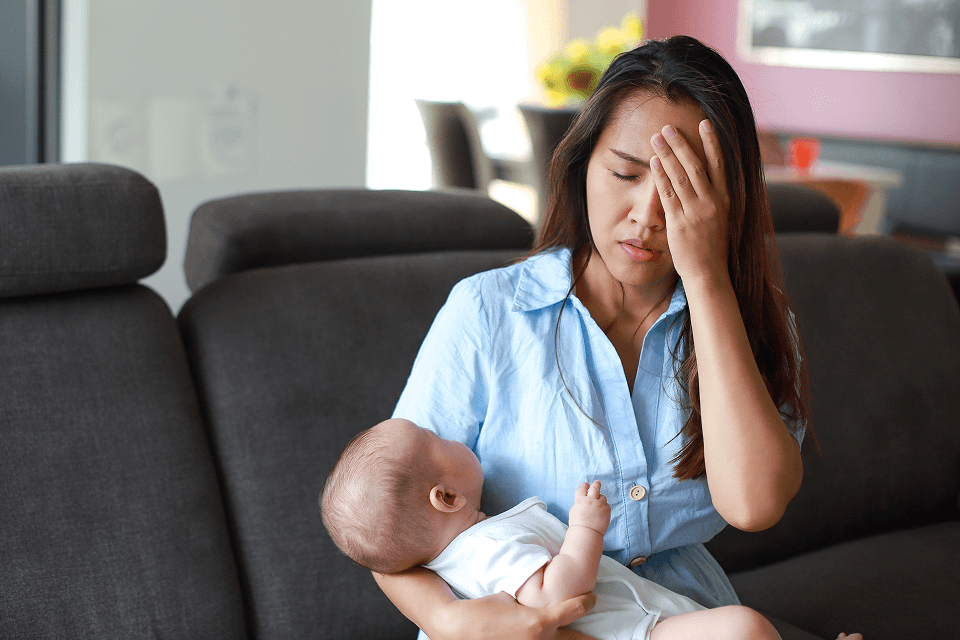Becoming a new parent can be exciting and stressful. Everything is new and babies do not seem to come with an instruction manual.
New routines, baby care and lack of sleep can make any new parent feel anxious. It is important to know that anxiety is common during pregnancy and after the birth of your baby. For some parents, pregnancy and the postpartum period can trigger anxiety. Anxiety can feel bad and interfere with how much you enjoy your new baby.
Recognizing the signs can help you know if you are having anxiety.
What is anxiety?
Anxiety disorders are very common; one in four people will experience an anxiety disorder in their lifetime. Anxiety is a common and normal reaction to a stressful situation. Anxiety is part of our survival instinct. It helps tell us if we are in danger and helps us focus on getting things done quickly. The nervousness usually goes away once the stressful situation is over. But if you are feeling anxious all the time, it could be an anxiety problem or disorder.
Anxiety can occur at any time in a person’s life. New parents, caregivers and grandparents may experience anxiety at this time.
How do I know if I have an anxiety disorder?
Occasional anxiety is a normal part of life. For people with an anxiety disorder, the anxiety does not go away and can get worse over time. The symptoms can interfere with daily activities such as taking care of your baby and relationships. If you have been experiencing any of the following symptoms, talk to your health-care provider:
- Worries or fears that don’t go away
- Excessive irritability
- Anger
- Trouble sleeping
- Racing thoughts
- Panic attacks
- Diarrhea
- Fear that something terrible might happen to you, your baby or someone else
- Heart races or pounds
- Light-headedness
- Shaking
- Sweating or chills
- Nausea
- Numbness or tingling
- Chest and throat feels tight
- Loss of appetite
- Shortness of breath
- Tight muscles
There are several types of anxiety disorders, including generalized anxiety disorder, panic disorder, social anxiety disorder and various phobia-related disorders.It can be difficult to stop feeling fearful or worried.
Reach out: Talk to your health-care provider if anxiety is taking up a lot of your time and energy or affecting your quality of life.
Note: Some new parents will also experience postpartum depression (PPD), or have both at the same time.
Where to get help
- Your public health nurse, doctor, midwife, nursing station, health centre or other health-care provider.
- Your doctor or health-care provider can refer you to a psychologist or counselor.
- If you do not have a doctor, visit the Family Doctor Finder – Province of Manitoba or call 204-786-7111 or toll-free 1-866-690-8260, TTY/TDD – 204-774-8618 or Manitoba Relay Services toll-free at 1-800-855-0511
- Check if you have coverage through your employee benefit plan at work. You may have some coverage for a psychologist. You may also have an Employee Assistance Program (EAP) that offers counseling.
If you are having thoughts of harming yourself or your unborn baby, or are in crisis, there is help available 24/7
- Suicide Crisis Helpline 9-8-8
- Klinic Community Health Centre Crisis Line – 204-786-8686 or toll-free 1-888-322-3019
- Manitoba Suicide Line – toll-free 1-877-435-7170
- Visit the website A Reason to Live
- First Nations and Inuit Hope for Wellness Helpline – toll-free 1-855-242-3310
- Service is available in Cree, Ojibway, Inuktitut, English and French
- WRHA Mobile Crisis Service - 204-940-1781
- 9-1-1 or your local emergency number
- If you need more information and help finding resources call Health Links-Info Santé at 204-788-8200 or toll-free 1-888-315-9257
Other online resources
- Postpartum Depression Association of Manitoba
- Mental Health Resource Finder – Shared Health
- Anxiety Canada
- Pacific Postpartum Support Society


